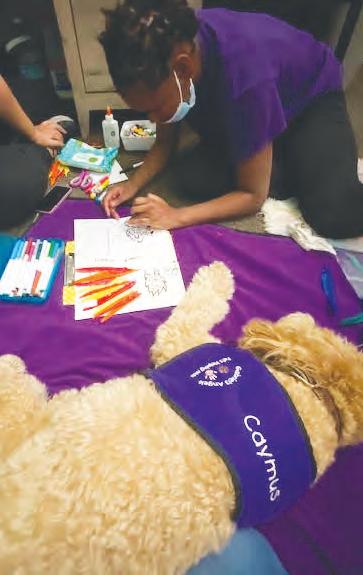
3 minute read
Gabriel’s Angels
Heavenly pack delivers unconditional love to children in need

Advertisement
By Cherese Cobb
Sammy slumps over his desk, scribbling patches of blue sky on a piece of paper. Meanwhile, some of his secondgrade classmates wrinkle their noses at the thought of eating green eggs and ham. And others wonder why storybook character Amelia Bedelia “trimmed a steak” with ribbons and lace. Sammy is on the autistic spectrum and cannot read so his kindergarten and first-grade teachers swapped story time for Crayolas and copy paper.
When Sammy’s grandmother discovered he wasn’t learning, she quickly transferred him to another school. Sadly, Sammy’s dad is in prison. His mom also pops in and out of his life. “Sammy had given up on himself,” said Melissa Steimer, CEO of Gabriel’s Angels (GA). “He would guess at words and flip through the book Where the Wild Things Are and create a story to match the pictures of the furry, troll-like monsters.”
Then one day, a GA’s volunteer named Jean brought Angus, her 130-pound Leonberger to read with Sammy. They spelled out A-N-G-U-S and played games with alphabet flashcards. Whenever Sammy successfully sounded out a letter, Jean would shower him with compliments and he would cheer and flash a huge smile.
Unconditional love—and more
In 2000, Pam Gaber and her Weimaraner, Gabriel, founded GA: a nonprofit that inspires confidence, compassion, and best behaviors in at-risk, abused, and neglected children through pet therapy. Since then, it has served 190,000 kids like Sammy throughout Arizona.
Unfortunately, the Grand Canyon State ranks 46th in child well-being. One out of every six youth in Maricopa County is at risk of being put into foster care, according to the National
Academy of Sciences. And Native American and Black children in the greater Phoenix area are twice as likely to be abused.
“Gabriel’s Angels is driven by the guiding philosophy that the unconditional love of a dog can heal a child,” Steimer said. Registered pet therapy teams—a dog (or occasionally a miniature horse, cat, or rabbit), a handler, and a helper—visit 120 crisis nurseries, Title 1 schools, domestic violence centers, and homeless shelters. They work with children as young as toddler, all the way up to age 18. Pet therapy teams offer more than unconditional love. They teach seven core behaviors: attachment, confidence, affiliation, respect, selfregulation, empathy and tolerance. They also focus on life skills like being kind to animals.
“The pandemic created more kids that are facing mental health and behavioral challenges,” said Steimer. Last year, 120 pet therapy teams, like Jean and Angus, worked with 12,287 kids, logging in more than 642 volunteer hours. Children who engaged with GA pet therapy teams had a 95 percent increase in confidence, 87 percent increase in attachment and 86 percent increase in respect.
Turning a whole day around
Children who need the most love, often ask for it in the most unlovable ways. As an example, Steimer recalls how Alyssa wasn’t nice to any of the other children or counselors. As a survivor of abuse, she lived in a residential treatment center for children with behavioral problems. After the 12-year-old cut herself, she was placed in restraints.
As part of GA’s Animal Assisted Therapy Program, Michelle and her Goldendoodle, Caymus, turned Alyssa’s whole day around. Alyssa and Caymus read two books together, played fetch, and even cuddled. Alyssa wrote, “I was having a bad day at first until Caymus came. He made me feel a lot better.”
Creating the connection
Consistency is the key to success. Every other week, pet therapy teams spend an hour with the same 10–12 children. Using a $200 activity kit, they start with a bingo sheet that’s loaded with facts about the dog’s breed. “The children love being able to understand a little bit more about the pets that are coming in to help them,” Steimer said. Younger children listen to the dog’s heartbeat with a stethoscope. It helps them understand how to treat the dog and how to act around it. “They’re making a powerful connection to another living, breathing creature.”
Animals, Books and Children Program


Powered by donations from the Virginia G. Piper Charitable Trust to The Lemonade Bunch (a preschool class at Summit School), Gabriel’s Angels’ ABC (Animals, Books and Children) Program helps struggling readers build fluency, vocabulary, and comprehension skills. At the end of the semester, children celebrate with their pet therapy teams. They receive a certificate of completion and a reading medal. They also get a backpack full of goodies, including magnet boards, alphabet letters, picture books and a stuffed dog.
“At the end of the day, with our pets next to us, there is no judgment,” Steimer said. “When a child is suffering, having this positive attachment to something really opens them up to new possibilities and increases their own confidence in what they’re able to do.”


Would you like to help?
If you’d like information on volunteering with GA, a 501(c) (3), you’ll find a great deal of information at gabrielsangels. org/faq/. You can attend an information session held the last Tuesday of each month. In addition, you can also mark your calendar for the annual fundraising event, A Night of PAWSabilities in Black and White, to be held on October 8th at the Arizona Biltmore. An event not to be missed! Contact Tina Lopez, tlopez@gabrielsangels.org for more information.
Gabrielsangels.org
602-266-0875









